Since 2014, it has been government policy that all pupils should leave school with least a grade 4 GCSE in both English and maths (or equivalent). Achieving this combination is often known as achieving the basics. Pupils who fall short of achieving the basics at age 16 are required to resit the relevant GCSE(s) or, in some cases, to take an alternative functional skills qualification.
And a lot of young people do not achieve the basics at age 16. Official figures for last year’s pupils aren’t out yet, but DfE data on the 2022/23 cohort shows that nearly 200,000 pupils in state-funded mainstream schools, a third of the cohort, did not receive a grade 4 or above in English and maths GCSE.
In this post, I’ll be using data submitted to us by schools using FFT’s Early Results Service to get ahead of the official figures and look at the pupils who did not achieve the basics last year.
Data
The data I’ll be analysing in this post was submitted to us by state-funded mainstream schools using our Early Results Service. It comes from around 1,500 schools and 290,000 pupils – roughly half the cohort.
Generally, we find that data collected from a large number of schools produces a close approximation of the national average but results for groups of pupils can sometimes be more variable. Do bear this in mind when interpreting the rest of the post.
Some basics about the basics
Before we get started, a word on the definition of ‘the basics’. In this piece, I’ll be using this to refer to achieving a grade 4 or above in GCSE maths, and in either GCSE English language or GCSE English literature. ‘Basics’ is also sometimes used to refer to achieving a grade 5 or above in the same subjects, but here I’ll be sticking to grade 4 or above.
Overall, 34% of pupils in our sample did not achieve the basics in 2023/24, almost the same as in the official figures for the 2022/23 cohort (33%). The chart below shows how this breaks down by gender and disadvantage status.
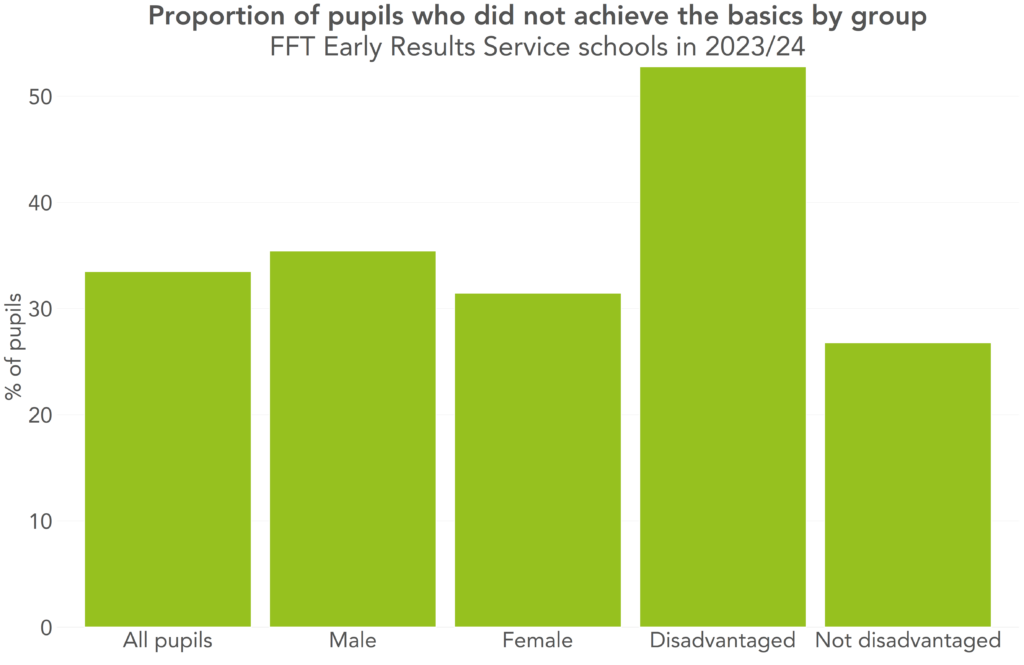
Boys were slightly more likely to fall short of the basics than girls, but the difference between disadvantaged pupils and their peers was far larger. More than half of disadvantaged pupils did not achieve the basics, compared to just over a quarter of their peers.
What grades did these pupils achieve?
Now we’re going to take a look at the grades of pupils who did not achieve the basics in more detail.
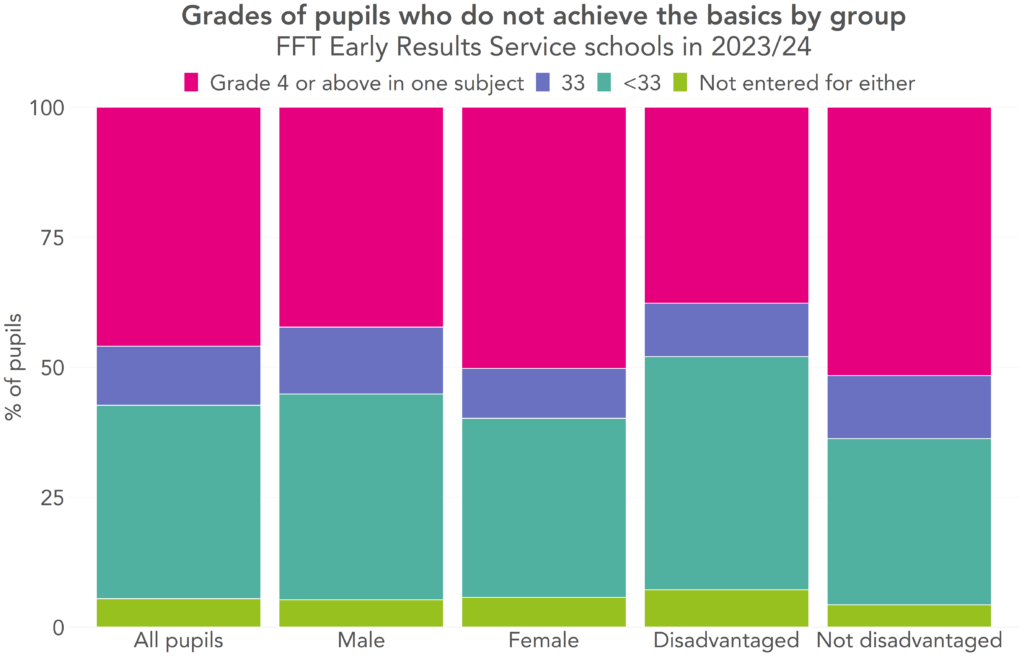
The majority of pupils were not far off achieving the basics. Close to half did achieve a grade 4 or above in either English or maths, and a further 11% achieved a grade 3 in both subjects.
But a substantial minority (38%) achieved less than a 3 in both subjects, and a further 5% were not entered for GCSEs in either subject.
When we break results down by gender, we can see that the majority of both male and female pupils either achieved a pass in one subject, or a 3 in both subjects. But male pupils were less likely to pass one subject then female students, and more likely to have achieved less than a grade 3 in both subjects.
The majority of non-disadvantaged pupils were not far off achieving the basics: 64% either passed one subject, or received grade 3 in both. But this compares to just 48% of disadvantaged pupils.
Disadvantaged pupils were more likely to have two grades below 3, and more likely to not be entered for either subject.
Pupils who passed one subject
Finally, let’s take a closer look at those pupils who achieved a grade 4 or above in one subject, but not the other.
These pupils were more likely to have passed English than maths, which is perhaps not surprising given that many pupils take GCSEs in both English language and English literature, but just one GCSE in maths.
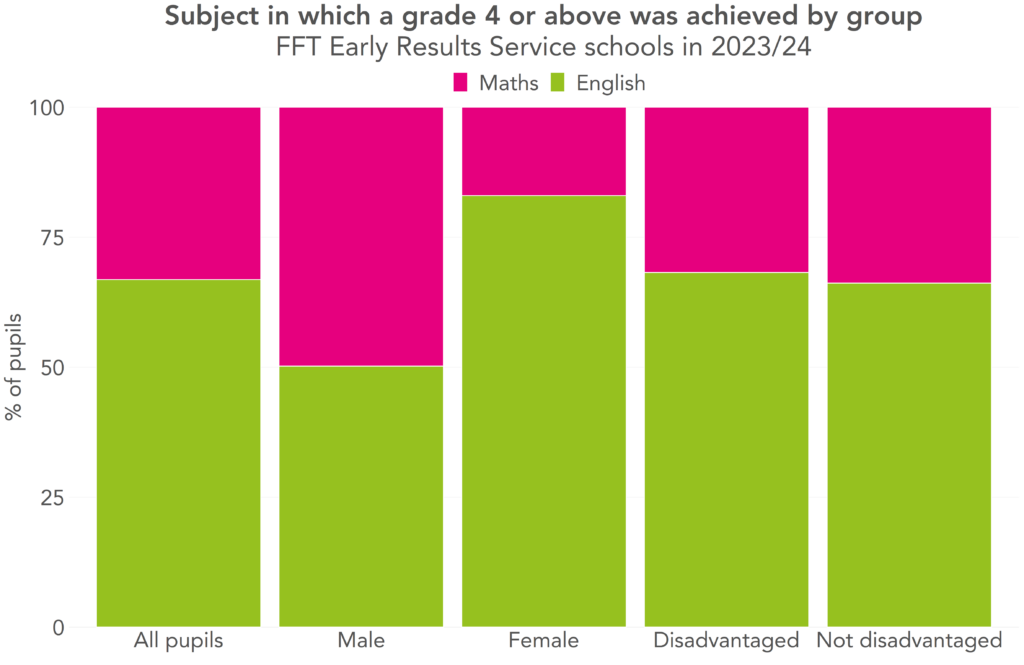
But when we break the data down by gender, we can see that the difference is mainly driven by female pupils. Male pupils were split 50/50 between passing English and passing maths, but just 17% of female pupils got grade 4 or above in maths but not in English.
The majority of those who achieved a grade 4 or above in one subject received a grade 4.
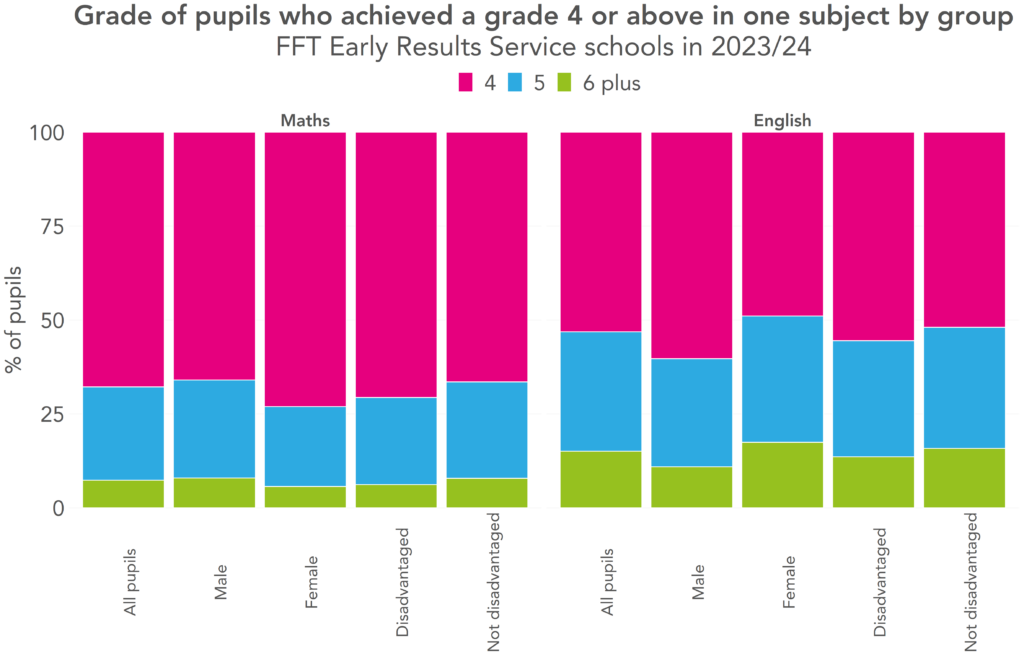
Of those who passed maths, 7% achieved a grade 6 of above, compared to 15% of those who passed English. Female pupils were more likely than male pupils to have received a grade 6 or above in English, and slightly less likely in maths. And disadvantaged pupils were slightly less likely to have a grade 6 or above in either subject.
Summing up
Based on our analysis of this sample of pupils, the majority of those who did not achieve the basics last year were not far short, but a substantial minority had either very low grades in both subjects, or weren’t entered for either.
Disadvantaged pupils were far less likely to achieve the basics than their peers, and were likely to be further from the mark if they did not achieve them.
And the same applied to male pupils, although the difference between male and female pupils was smaller than that between disadvantaged pupils and their peers. But there were very marked gender differences by subject: female pupils were far more likely to achieve a grade 4 or above in English but not in maths than they were to achieve a grade 4 or above in maths but not English, while either situation was equally likely for male pupils.
The resits policy remains firmly in place for now, and recent changes are bringing in minimum teaching hours for those taking resits. Full-time students who did not achieve the basics will be expected to receive three hours of teaching in English and/or four hours in maths per week. And while this is only an expectation this academic year, it will become a requirement from 2025/26.
And with around 200,000 pupils per cohort not achieving the basics, that equates to a huge number of teaching hours.



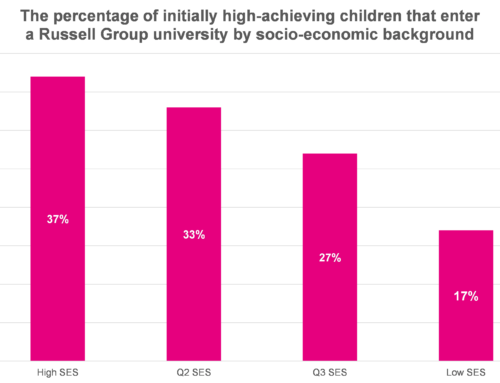
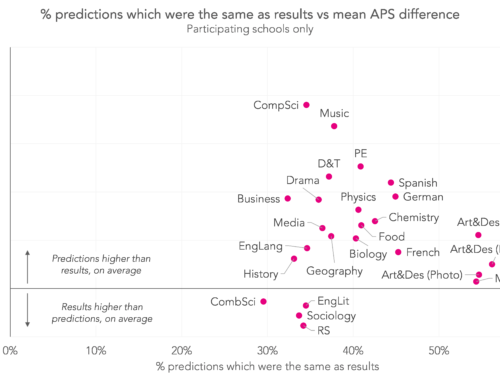

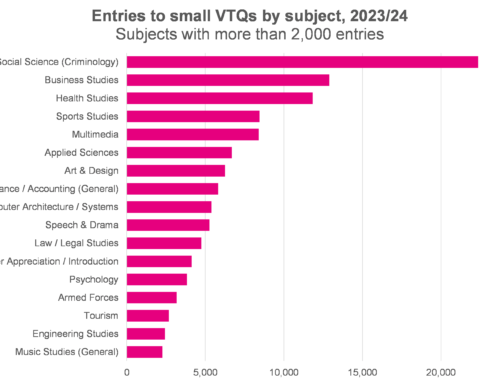
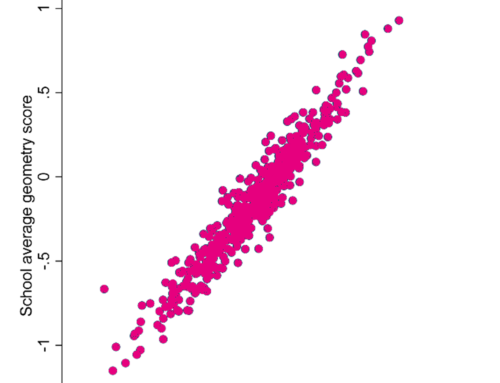
I support students with ehcps and a significant number have been refused post 16 places and some are being forced to sit both GCSEs in Maths AND English post 16 despite having a level 2 Functional Skills qualification in English already. College will not budge. It would be great if your report included the data on students with EHCPs and also the percentage that actually achieve the 4s after repeating again and again until they are 19, with a focus again on those with EHCPs. Thanks
Thanks for this Luna. We are planning to take a look at the pupils who do take resits and whether they go on to achieve grade 4s in another blog – we’ll get into how this breaks down for pupils with EHCPs then.
My daughter is resitting maths again. It affects her ability to complete her level 3 course well which will affect her employability more than having a grade 4 in maths.
My daughter, recited twice and she has not passed maths , each time she is two points away from scoring 4 , due to this haven’t complications and getting into a 6 from.
I would be interested in seeing the percentage of summer born students who do not get a Grade 4 in GCSE Maths and English. I am a primary school teacher and a parent with August born daughters.
Thanks Emer, we’re looking at doing a follow up where we should be able to address this.
I work in Alternative provision. As English lead I switched to iGCSE for English Language which helped our pass rate. Unfortunately, the schools who place students with us are unhappy as these grades will not count on their school’s league tables. This angers me so much. Who is the grade for? The current GCSE options for English are archaic and unfit for purpose. Yet again, the system is failing a cohort of young people who deserve better, especially those who are already disadvantaged. The politicians who banned use of iGCSE send their kids to private schools where it is accepted. Makes my blood boil.
Each year grades boundaries are ‘adjusted’ to ‘maintain’ a certain percentage of pupils achieving a grade 4, irrespective of whether or not pupils understand the subject. Also, the longer a sylabus is in place the more pupils are able to acheive a grade 4 or above as teachers know what is required for the exam. My daughter has attempted the English 4 times since June 2022 and each time she would have achieved a grade4 based on the previous grade boundary. Between June 2034 and June 2024 she gained 27 marks on her previous mark and yet still missed the grade 4, again due to moving the grade boundary. She was 13 marks off in the last exams!!! She now refuses to even think about resitting, and questions what is the point. She has recently achieved her Level 3 Health and Social Care qualification with B’s and C’s (equivalent to A level!). Figure that one out!!
This is such an interesting area. Especially from a gendered perspective. Girls without Maths and English ( nearly double will be from disadvantaged backgrounds too) passes at GCSE overwhelming pick Health and Social Care or Hair and Beauty ( all Level 1 choices) subjects at college. This massively impacts their choice of career in later life.
Like Luca I would welcome more data on students with EHCPs. What does the progression for these students look like.
Does disadvantaged refer to economically disadvantaged or SEN? A huge problem is “off rolling” where students are removed from the school rolls to artificially inflate the exam scores of the school; those children are subsequently enrolled in “alternative” placements where the provisions for what they receive vary depending on local authority and even the tutor (like most things what they are entitled to on paper and what they are actually provided differ markedly). The reason I asked whether disadvantaged means economic or special educational needs students is because a lot of the worst offenders at offrolling- though by no means all- are in affluent areas where the Academy Trusts (who, being comprehensives, can not be selective) want to compete in the league tables with the grammars and private schools, who are allowed to be selective.
An academy trust in Surrey which is highly sought after has been in the media multiple times for offrolling and unlawful exclusions and “cool downs” for students who aren’t expected to meet the desired GCSE grades of the school administrators. These students then end up with no qualifications, or the bare minimum provided through alternative placements.
Like Debra, I’m concerned with the shifting grade boundaries because by shifting the grade boundaries to maintain a certain amount of students achieving a certain grade, it makes it hard to actually work out what students from different cohorts know in relation to each other.
Hi Oliver. We mean economically disadvantaged here but I do agree that SEN is something to consider as well. And the potential of off-rolling is always a concern – as are any other unwanted ‘side effects’ from performance measures!
I think it’s important to remember that the grade boundaries change to reflect the experience of how difficult the papers turned out to be, using expert examiner judgment – not to maintain rates. Boundaries go down as well as up, over time, if for example a set of papers is found to be unexpectedly demanding. While there is inevitably an element of subjectivity in that, there is also some moderation via National Reference Tests. Of course, whether current GCSE assessments measure what we should be most valuing is another matter….